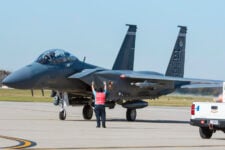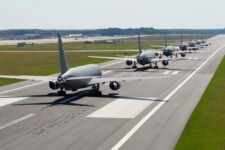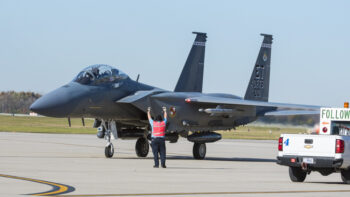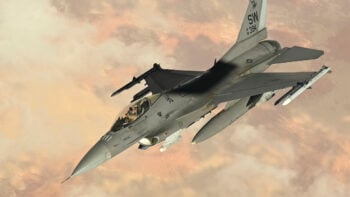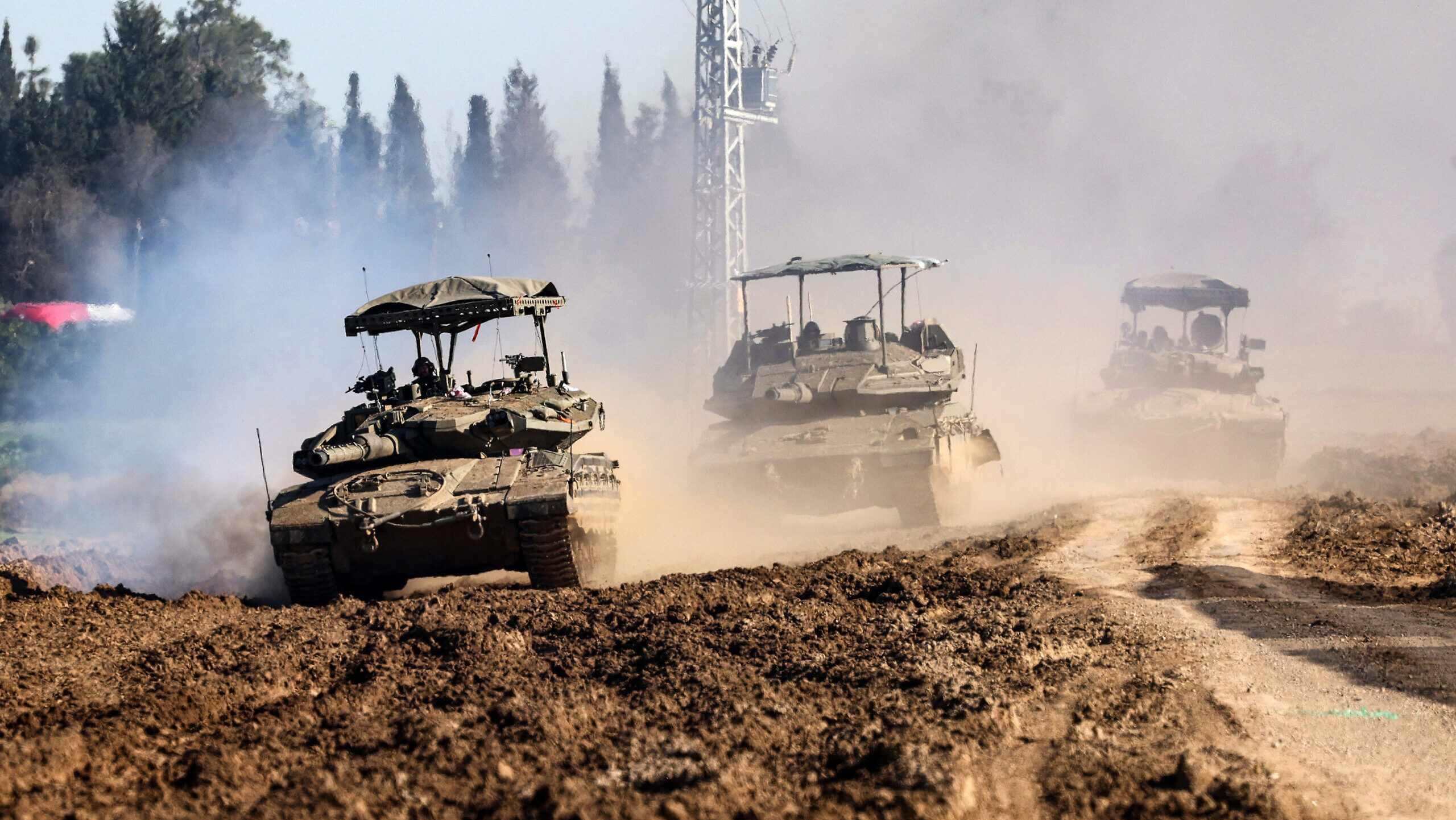
Israeli army battle tanks roll in southern Israel along the border with the Gaza Strip on February 7, 2024, amid ongoing battles between Israel and the Palestinian militant group Hamas. (Photo by JACK GUEZ/AFP via Getty Images)
JERUSALEM — Israel’s former Defense Minister Benny Gantz said earlier this week that Israeli operations in Gaza will become more “focused” in the future, following months of aerial bombardment and aggressive urban fighting.
“In the fighting in Gaza, we have moved to a more focused fighting, it is not less powerful, but it is directed at precise targets,” he said.
But whether Israeli Defense Forces do manage to focus their operations to root out Hamas in Gaza, several Israeli experts expressed concern in interviews with Breaking Defense that the Israeli government hasn’t answered key questions about its goals for the military operations and the future of Israeli security — beyond the “absolute victory” pledged Wednesday by Israeli Prime Minister Benjamin Netanyahu.
“What is it that we want to see happening?” asked Eran Lerman, former Israeli deputy national security advisor and now vice-president of the Jerusalem Institute for Strategy and Security. “There is no disagreement as to the need for Hamas to cease to be the governing force in Gaza. … In order for this to be not just a sentiment but a coherent plan we need to do a few things. And we aren’t doing them.”
RELATED: America took its eye off Iran with Indo-Pacific pivot, ex-CENTCOM chief says
Chuck Freilich, also former Israeli deputy national security advisor and senior fellow at the Institute for National Security Studies, told Breaking Defense, “I think there is a danger this could end up being just another big round.” Freilich was referring to similar campaigns waged by Israel in 2009, 2014 and other conflicts in Gaza, which failed to root out Hamas.
The militant group, Freilich said, is “trying to survive the Israeli response [to Oct. 7] and fight the next round. It’s part of the Iranian-backed strategy of long-term attrition [against Israel] until destruction.”
“Militarily we have to win this one,” he said.
Last month Israeli officials began suggesting a shift to less intense operations in the north, where large-scale military operations were being pared back, though fighting continued in the south of Gaza.
“It became time to do what the US had been advocating, of reducing overall presence and more targeted in and out raids,” Freilich said.
The IDF began to withdraw several reserve brigades and the 36th division from Gaza in January, illustrating that it was redeploying some forces after 100 days of combat. However, IDF Chief of Staff Herzi HaLevi in a visit to Khan Younis on Jan. 25 noted that the “fighting was very intense” in that southern city still.
A more focused fight, should it come to pass, would likely be welcome in Washington, where for months the US has been pushing Israel to lessen civilian casualties. The Hamas-controlled Health Ministry in Gaza says nearly 30,000 people have been killed since Israel launched reprisal attacks for the Oct. 7 Hamas assault that killed approximately 1,200 Israelis. The Israeli military says about 10,000 Hamas fighters are among the dead in Gaza.
Rafah And Egypt
Lerman noted that beyond the fighting in Khan Younis, concerns remain about what will happen next in places like Rafah on the Egyptian border, the last major stronghold of Hamas in Gaza.
“Unless we find a way to channel out the civilian population, we are in a very serious bind,” he said.
Gantz said that Khan Yunis is surrounded, and he said “we will soon reach Rafah and anywhere that Hamas terrorists are.”
Freilich pointed to the importance of securing the “Philadelphi Corridor” along the Egyptian border where Rafah is located and where arms are suspected to be smuggled into Gaza. This is a densely populated area, made more so by the evacuees and internally displaced people from other areas of Gaza. Egypt has expressed concern about any Israeli operations along the border.
“We have to maintain a good relationship with Egypt,” says Freilich. However, “leaving the Philadelphi corridor in their [Hamas] hands is too dangerous and allows them to reconstitute quickly, if we want this round to end differently than previous rounds, that is critical.”
Siboni thinks Israel “absolutely” will operate in Rafah. Lerman agrees, noting Israel needs to find a way to have a productive conversation with Egypt.
Much of the military planning, of course, could hinge on ongoing hostage negotiations, noted Lazer Berman, a former IDF analyst-turned-journalist.
If a cease-fire takes place, he said, “there is no guarantee that the IDF can start the fighting again given the intense pressure that will be applied on Israel to end the war. If it doesn’t, Israel has to decide what it wants to do about Rafah and the Philadelphi Route … If Israel doesn’t retake Philadelphi for the foreseeable future, it’s hard to see how it can prevent Hamas from rearming.”
Back In The North
Should Israel be successful in military operations in Rafah, there’s still concern about what happens in the north, where the Israeli military had success against Hamas.
Already there are reports of Hamas reasserting power in areas from which Israel withdrew.
Despite the fighting there, Lerman said there could be 400,000 people still in northern Gaza.
“There are attempts by Hamas to retrieve some semblance of governance,” he said. “So all of this means that unless we cut off the snake’s head down south, it’s going to be a long business before we can safely allow a slow process of the displaced population to go up north.”
He said that unless Hamas is thoroughly demoralized and ceases to function in Gaza, there is a danger that it will re-emerge in the north, as it has done after previous rounds of fighting.
Overall, Reserve Col. Gabi Siboni of the Misgav Institute for National Security, appeared prepared for a much longer-term operation than many are suggesting, saying it will take years to dismantle the “fortress” of tunnels and weaponry Hamas stockpiled in Gaza.
“The IDF,” he said, “is determined to accomplish this mission.”
Air Force awards SNC $13B contract for new ‘Doomsday’ plane
The win is a major victory for the firm in a competition that saw the surprise elimination of aerospace giant Boeing.

